Baby On Board: What Does Texas Law Say About Keeping Our Kids Safe in the Car?
 We’ve all seen those yellow “Baby on Board” signs proudly displayed by new parents on the back windows of cars. In a perfect world, drivers would slow down and car accidents involving children would never be an issue. But we don’t live in a perfect world. The Insurance Institute for Highway Safety (“IIHS”) reports that car accidents cause one in four unintentional injury deaths in children younger than 13. The IIHS explains that while most crash deaths occur among children traveling as passengers, proper restraint use dramatically reduces these fatalities.
We’ve all seen those yellow “Baby on Board” signs proudly displayed by new parents on the back windows of cars. In a perfect world, drivers would slow down and car accidents involving children would never be an issue. But we don’t live in a perfect world. The Insurance Institute for Highway Safety (“IIHS”) reports that car accidents cause one in four unintentional injury deaths in children younger than 13. The IIHS explains that while most crash deaths occur among children traveling as passengers, proper restraint use dramatically reduces these fatalities.
Such statistics are a sobering reminder that we must do all we can do to ensure that our kids are safe while traveling in a car. So what can Texas families do to make our daily commutes safer for our children? What does Texas law say about keeping our kids safe in the car?
Car Seat Laws in Texas
The car seat law in Texas, meaning the rules for which you can be issued a Class C citation, are provided in the Transportation Code. Section 545.412(a) of the Texas Transportation Code states:
“A person commits an offense if the person operates a passenger vehicle, transports a child who is younger than eight years of age, unless the child is taller than four feet, nine inches, and does not keep the child secured during the operation of the vehicle in a child passenger safety seat system according to the instructions of the manufacturer of the safety seat system.”
SUMMARY OF TEXAS CAR SEAT LAW:
- 8 years – Children must remain in some sort of car seat or booster seat system until they are 8 years old;
- 4’9″ Tall – If a child younger than 8 is taller than 4’9″, he or she may ride in a normal seat without a booster; and
- Follow manufacturer instructions – It is a violation to use a safety seat improperly.
One of the important parts of the Texas car seat law is that seat must be properly installed according to the manufacturer’s instructions. USA Today reports that nearly half of all car seats are installed improperly. Many law enforcement agencies are trained to understand proper car seat installation. While it is unlikely that an officer will issue you a citation if you have a car seat that happens to be improperly installed, you should still make sure to get your car seat checked out for the safety of your child.
DEFENSE: It is a defense to prosecution that the individual is operating their vehicle during an emergency or for a law enforcement purpose.
PENALTY: Failure to comply with §545.412(a) may result in a fine ranging from $25 to $250, plus court fees.
Car Seat Guidelines in Texas
Some additional car seat tips are provided as safety guidelines or best practices, meaning that there is not a law on the books in Texas covering this. However, these are good practices that are taught by doctors and child car safety experts:
- All infants and toddlers should ride in a rear-facing car seat until they are at least two years old, or until they max out the weight or height limits per the manufacturer’s limits.
- Children two to four years old may ride in a forward-facing seat according to the manufacturer’s recommendations.
- Use a booster seat for children four to eight years old, according to the maximum height or weight limits provided by the manufacturer.
- Most seat belts will fit a child that is 4’9″ tall (normally around 10 years old). If your child is not 4’9″ tall, you should consider keeping them in a booster seat to ensure proper seatbelt fit.
Seat Belt Laws in Texas
Under Texas law, all passengers in a motor vehicle must wear a seatbelt. There are a few exceptions, like for postman, paper delivery crews, or garbage men; but for the average driver and passenger on the Texas roads, you must wear a seat belt. Section 545.413(a) of the Texas Transportation Code covers seat belt laws in Texas. The law states:
“a person commits an offense if the person, who at least 15 years of age, rides in a passenger vehicle while the vehicle is being operated and is occupying a seat that is equipped with a safety belt, and is not secured by a safety belt.”
Further, §545.413(b) states that:
“a person commits an offense if the person operates a passenger vehicle that is equipped with safety belts and allows a child, who is younger than 17 years old and not required to be in a safety seat system, to ride in the vehicle without requiring the child to be secured by a safety belt.”
Can a Teenager Ride in the Bed of a Pickup Truck? No. Under Texas law, no person under 18 years of age may ride unrestrained in the bed of a pickup truck.
PENALTY: A violation of the seat belt law in Texas can result in a fine of $25 to $200 depending on the situation.
For teenagers, who are legally permitted to ride in the front passenger seat, the Texas Department of Transportation advises that wearing a seat belt while sitting in the front seat improves survival of a car accident by 50%. To be effective seat belts must be used properly—lap belts need to fit snugly on the hips and shoulder belts should go over the shoulder and across the center of the chest. Texas law says that safety belts—designed for adult use only—are not adequate for children under 8.
Front Seat and Back Seat Passenger Laws in Texas
There is not a law in Texas regarding who may ride in the front seat. The driver must follow the car seat and seat belt laws, but there is not a law prohibiting any person or child from riding in the front seat. However, according to the safety “guidelines,” anyone under age thirteen should be restrained in the back seat due to concerns with airbag impact.
Yes, but only for 5 minutes. In 2010, thirteen children in Texas were killed by vehicular heatstroke. As a result, the Texas legislature enacted laws dealing with the amount of time children can be left in a vehicle unattended. Under Texas Penal Code §22.10(a), “a person commits an offense if he intentionally or knowingly leaves a child in a motor vehicle for longer than five minutes, knowing that the child is (1) younger than seven years of age; and (2) not attended by an individual in the vehicle who is 14 years of age or older.”
An offense under this section is a Class C misdemeanor. However, if the child is injured as a result of being left in the car, the crime can be increased to a felony, punishable by up to two years in jail and a $10,000 fine.
For More Information About Car Safety in Texas:
Barnett Howard & Williams PLLC
Rated 5.0 out of 5 based on
57 Google+ Reviews.
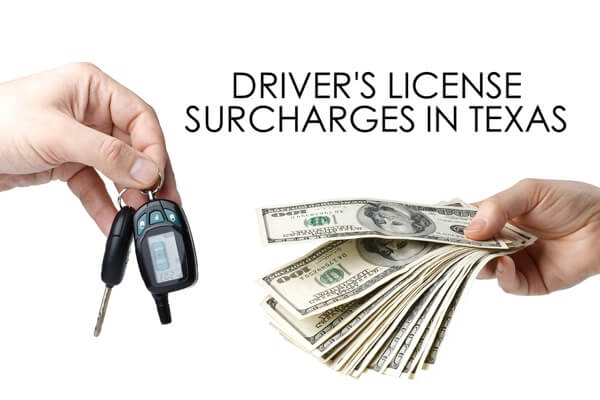

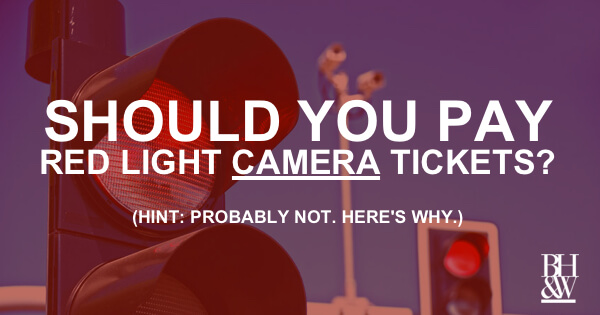
 Anytime someone gets a ticket in the mail from a red light camera, the same questions run through their mind. Do I really have to pay this ticket? Is that even me driving? How do they know whether that is me? What happens if I don’t pay this ticket? Why do we even have those cameras anyway? There are a ton of rumors out there and plenty of people ready to tell you that you do or don’t have to pay that ticket, but what is the actual answer?
Anytime someone gets a ticket in the mail from a red light camera, the same questions run through their mind. Do I really have to pay this ticket? Is that even me driving? How do they know whether that is me? What happens if I don’t pay this ticket? Why do we even have those cameras anyway? There are a ton of rumors out there and plenty of people ready to tell you that you do or don’t have to pay that ticket, but what is the actual answer? 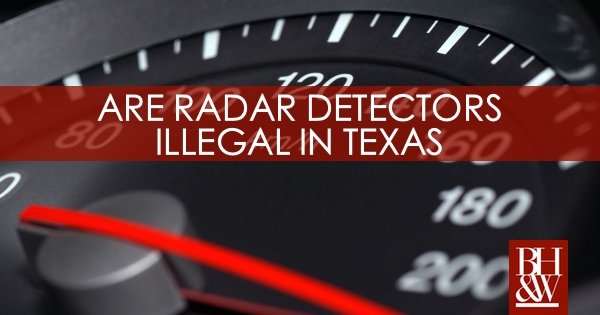
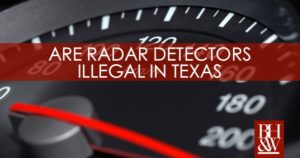 Lets face it, most of us have received a speeding ticket at some point in our lifetime. As a result, radar detectors have become commonplace for drivers that want to take preventative measures to avoid receiving a ticket. Such preventative measures bring up an important question: are radar detectors illegal? Can I get a ticket for using a radar detector?
Lets face it, most of us have received a speeding ticket at some point in our lifetime. As a result, radar detectors have become commonplace for drivers that want to take preventative measures to avoid receiving a ticket. Such preventative measures bring up an important question: are radar detectors illegal? Can I get a ticket for using a radar detector?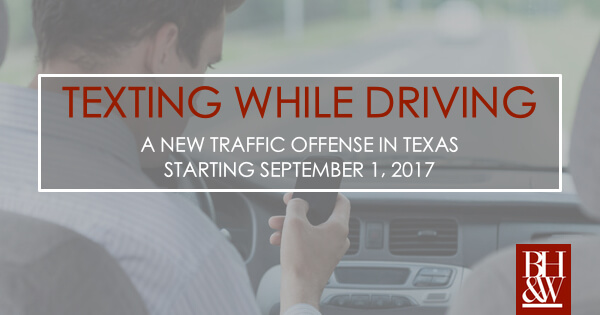
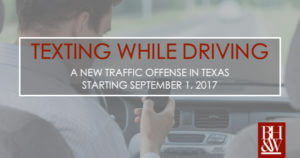 Virtually every state in America has a statewide law banning the use of cell phones or texting while driving. Until recently, Texas has had minimal restrictions on cell phone usage while driving. Such restrictions include:
Virtually every state in America has a statewide law banning the use of cell phones or texting while driving. Until recently, Texas has had minimal restrictions on cell phone usage while driving. Such restrictions include: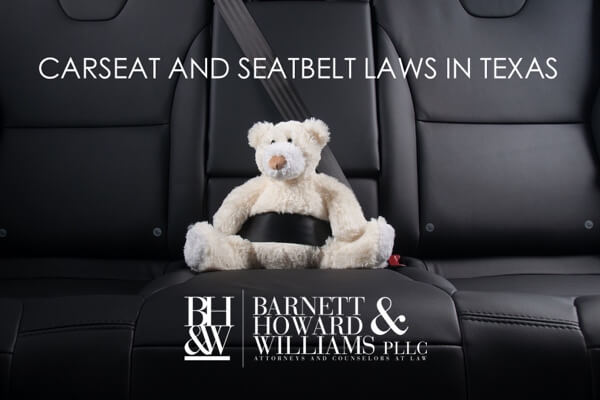
 We’ve all seen those yellow “Baby on Board” signs proudly displayed by new parents on the back windows of cars. In a perfect world, drivers would slow down and car accidents involving children would never be an issue. But we don’t live in a perfect world. The Insurance Institute for Highway Safety (“IIHS”) reports that car accidents cause
We’ve all seen those yellow “Baby on Board” signs proudly displayed by new parents on the back windows of cars. In a perfect world, drivers would slow down and car accidents involving children would never be an issue. But we don’t live in a perfect world. The Insurance Institute for Highway Safety (“IIHS”) reports that car accidents cause 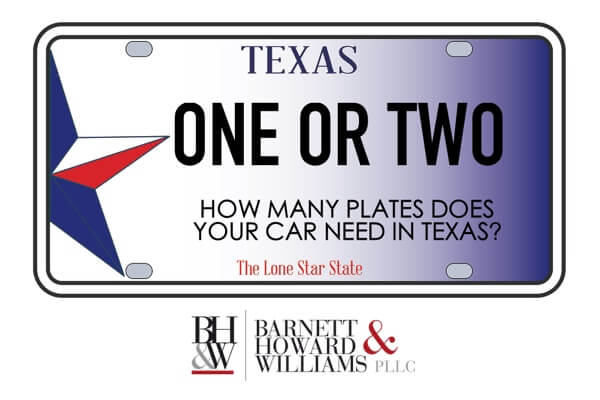
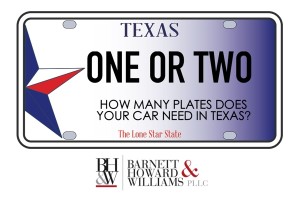 How many license plates does your vehicle need in order to comply with Texas law? Do you need one or is there a two plate rule? Should you drill holes into the front bumper of your car to install a front license plate, or will you be alright with a rear plate only? If you are reading this article, perhaps you have exhaustively Google-searched license plate laws out of frustration. Find out what the Texas Transportation code says about license plates and what the implications are for you, the Texas motorist.
How many license plates does your vehicle need in order to comply with Texas law? Do you need one or is there a two plate rule? Should you drill holes into the front bumper of your car to install a front license plate, or will you be alright with a rear plate only? If you are reading this article, perhaps you have exhaustively Google-searched license plate laws out of frustration. Find out what the Texas Transportation code says about license plates and what the implications are for you, the Texas motorist.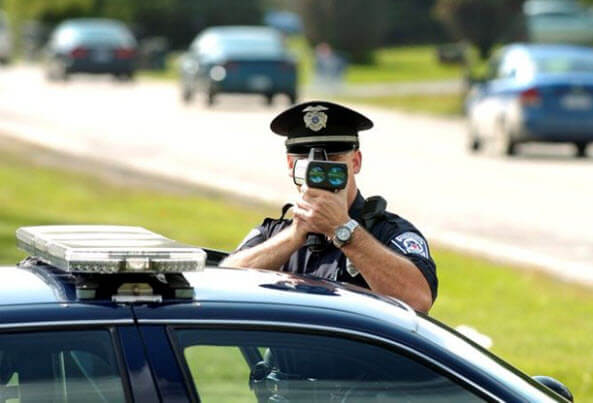
 Arias v. State
Arias v. State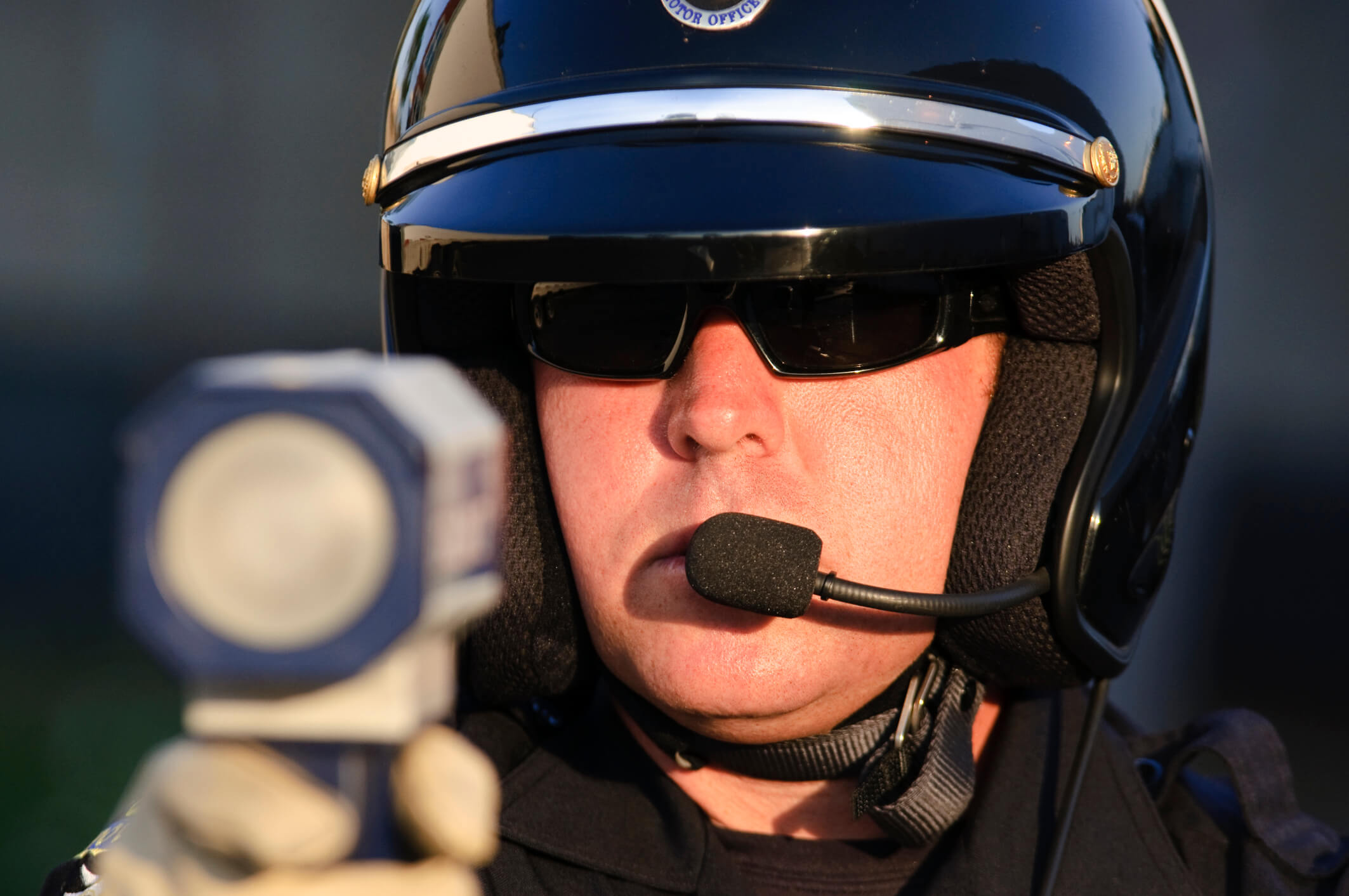
 If you’re reading this, odds are that you’ve been ticketed for one or more traffic offenses at some point in your life. Among the ticket-receiving public, misconceptions and misunderstandings abound regarding whether you should “fight” a ticket. Below is some advice from a former municipal prosecutor in the Dallas Fort Worth metroplex…
If you’re reading this, odds are that you’ve been ticketed for one or more traffic offenses at some point in your life. Among the ticket-receiving public, misconceptions and misunderstandings abound regarding whether you should “fight” a ticket. Below is some advice from a former municipal prosecutor in the Dallas Fort Worth metroplex…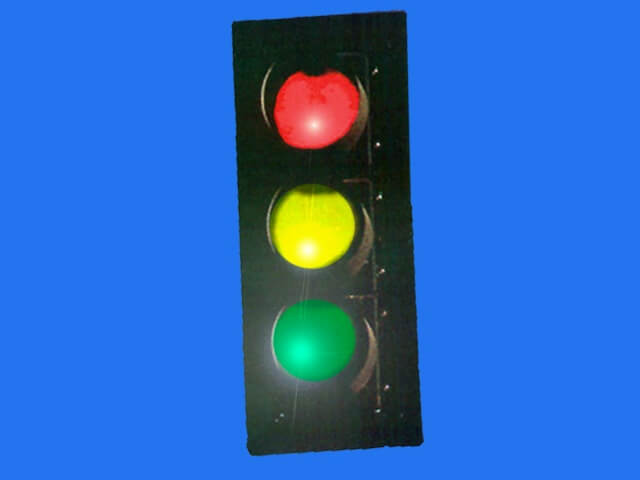
 Many of our criminal cases begin with traffic offenses. Something as simple as failing to signal for a lane change can quickly become a DWI investigation if the officer suspects the driver has been drinking. Often, during a traffic stop an officer will ask for consent to search the vehicle and then, depending on what might be in the car, the traffic stop turns into an arrest for possession of an illegal substance or contraband. (Tip: Never give consent to search. Ever.)
Many of our criminal cases begin with traffic offenses. Something as simple as failing to signal for a lane change can quickly become a DWI investigation if the officer suspects the driver has been drinking. Often, during a traffic stop an officer will ask for consent to search the vehicle and then, depending on what might be in the car, the traffic stop turns into an arrest for possession of an illegal substance or contraband. (Tip: Never give consent to search. Ever.)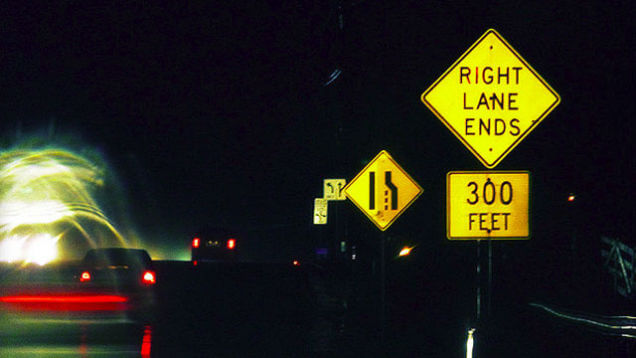
 Back in 2010, we posted about Mahaffey v. State, a case in which the CCA directed the 12 District Court of Appeals (Tyler) to determine whether a “lane merge” is a “turn” under the Texas Transportation Code, such that it requires a driver to signal. If a “merge” does not require a turn signal (as the appellant failed to do in this case), then the police stop was improper (without reasonable suspicion) and the evidence of his
Back in 2010, we posted about Mahaffey v. State, a case in which the CCA directed the 12 District Court of Appeals (Tyler) to determine whether a “lane merge” is a “turn” under the Texas Transportation Code, such that it requires a driver to signal. If a “merge” does not require a turn signal (as the appellant failed to do in this case), then the police stop was improper (without reasonable suspicion) and the evidence of his 





